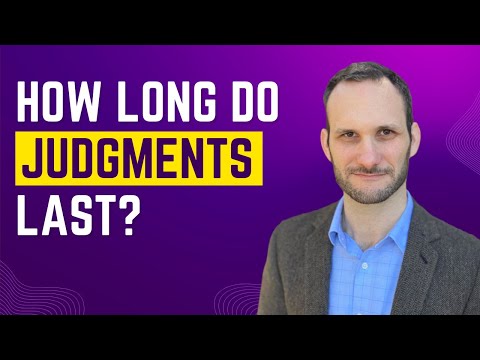A judgment in Florida lasts for 20 years from the date it is entered by the court. After 20 years, the judgment becomes unenforceable unless renewed.
What Florida Law Says About Judgment Duration
Florida Statute 55.081 states that a judgment is enforceable for 20 years. A judgment does not have to be recorded to be valid. Even without recording, a creditor can garnish bank accounts, levy personal property, and pursue other collection actions during the 20-year life of the judgment.
How to Create a Judgment Lien in Florida
Recording a certified copy of the judgment with the Clerk of Court creates a lien on the debtor’s real property in that county. A creditor must record the judgment separately in each Florida county where the debtor owns property to create liens in multiple locations.
Only a certified copy of the judgment will create a lien. The recorded lien automatically attaches to all non-exempt real estate owned by the debtor in that county. Recording the judgment does not require the creditor to identify specific property addresses.
We help protect your assets from creditors.
Jon Alper and Gideon Alper are nationally recognized experts in asset protection planning with over 50 years of combined experience. They provide all services remotely by phone or Zoom.

How Long Does a Judgment Lien Last in Florida?
A judgment lien based on real property lasts for 10 years from the date the certified judgment is recorded. After 10 years, the creditor must re-record the judgment following Florida Statutes section 55.10 to extend the lien for another 10 years. However, the lien can never outlive the underlying 20-year judgment lifespan.
If a creditor fails to re-record within the statutory window, the lien on real property automatically expires.
Do Judgment Liens Attach to Florida Homestead Property?
Judgment liens do not attach to a debtor’s Florida homestead property. The Florida Constitution protects homesteads from civil money judgments. A creditor cannot place a lien on a debtor’s primary residence as long as it qualifies for homestead protection.
However, if the debtor abandons the property as a homestead—for example, by moving out or renting it—the recorded judgment lien can attach to the property.
How to Remove a Judgment in Florida
There are only four ways to remove or eliminate a judgment in Florida:
- Pay the judgment in full.
- Settle the judgment with the creditor for a reduced amount.
- Discharge the judgment through bankruptcy (Chapter 7 or Chapter 13).
- Wait 20 Years until the judgment expires under Florida’s statute of limitations.
Frequently Asked Questions About Judgments in Florida
Can a judgment be renewed after 20 years in Florida?
Florida law does not allow a judgment to be renewed after the 20-year period has expired. Creditors must act within 20 years to collect or extend their lien rights.
Can a creditor garnish wages without recording the judgment?
Yes. A judgment creditor can garnish wages or bank accounts even if the judgment has not been recorded. Recording a judgment mainly affects real estate liens, not personal property collection.
What happens if a judgment lien is not re-recorded?
If a creditor does not re-record a certified copy of the judgment before the 10-year lien expiration, the lien on real estate expires. The underlying judgment itself, however, may still be enforced through other collection methods until the 20-year period ends.
Sign up for the latest information.
Get regular updates from our blog, where we discuss asset protection techniques and answer common questions.









